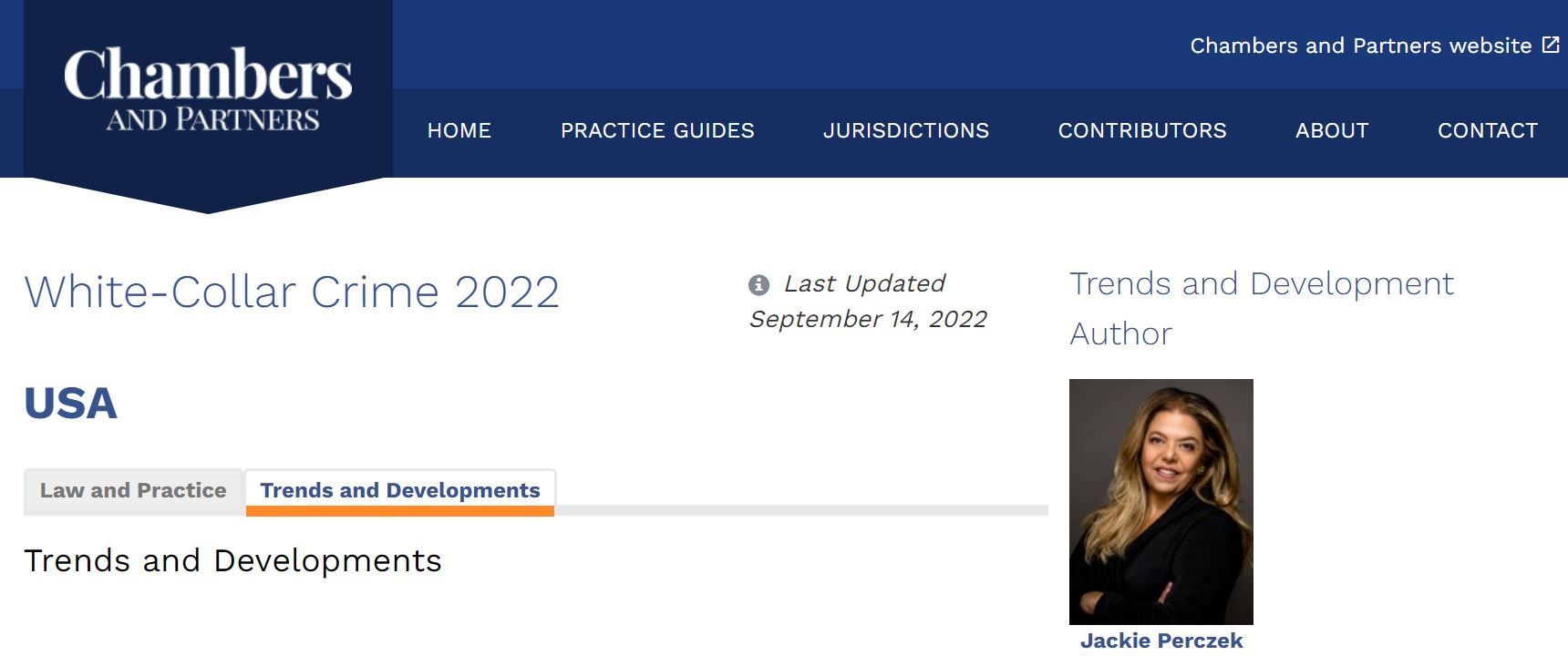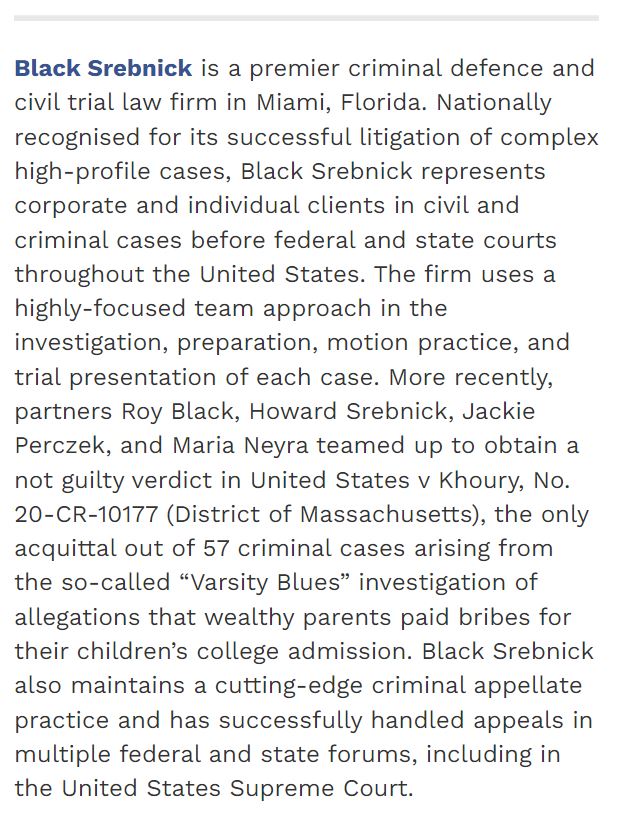2022 Trends in Corporate Criminal Enforcement

|
2022 Trends in Corporate Criminal Enforcement The Justice Department is coming for you In a series of co-ordinated remarks delivered recently by the Attorney General, the Deputy Attorney General, and other senior leadership figures at the US Department of Justice, the United States announced a new level of intensity in investigating corporate crime, demanding corporate responsibility, and in pursuing the Justice Department’s top priority for corporate criminal enforcement: going after individuals |
|
who commit and profit from corporate crime. In the department’s own words, “the warning is simple: the Justice Department is coming for you”.
The department’s current trend builds on policy changes that the Deputy Attorney General announced in October 2021, which cover a wide range of corporate criminal enforcement areas. These changes include:
- evaluating the completeness of a company’s voluntary self-disclosure of malfeasance, including whether the company has provided all information concerning all persons involved in misconduct, regardless of their position or stature within or outside the company;
- vigorously prosecuting all individuals involved in or responsible for the company’s misconduct;
- weighing a company’s entire history of criminal, civil, and regulatory misconduct in determining whether to defer or decline criminal prosecution;
- considering whether the financial compensation for employees, managers, and executives promotes compliance and a culture that rejects wrongdoing for the sake of profit; and
- increasing the use of monitorships to ensure the company’s compliance with the terms of a criminal resolution.
Also in October 2021, the Deputy Attorney General announced the creation of a Corporate Crime Advisory Group within the Justice Department, with a broad mandate to study then-existing corporate criminal enforcement policies and practices and recommend guidance and reform necessary to strengthen the department’s approach to corporate crime.
Nearly a year later and on the heels of massive corporate guilty pleas by Glencore (which agreed to pay USD1.5 billion in criminal penalties for committing commodities fraud), Fiat-Chrysler (which agreed to pay USD300 million for committing emissions fraud), and a unit of Allianz (which agreed to pay USD5.8 billion for committing securities fraud), the Deputy Attorney General announced the findings of the Advisory Group and the associated changes to the Justice Department’s corporate criminal enforcement.
The Deputy Attorney General also announced that the Justice Department has sought a USD250 million budget from Congress for FY2023 to be used for corporate crime initiatives. Far from these policy changes being the culmination of the department’s work, it is likely that there will be an escalation of the department’s enforcement efforts and prosecution of corporate crime.
The math is simple: voluntary self-disclosure is good business
In her September 2022 remarks, the Deputy Attorney General declared that the clearest path for a company to avoid the filing of criminal charges or a guilty plea is by voluntarily disclosing its malfeasance. “We expect good companies to step up and own up to misconduct”. In the department’s view, timely voluntary self-disclosure (and remediation) shows that the company has a vigorous compliance programme and fosters a culture that encourages the reporting of misconduct.
Thus, absent aggravating factors such as criminal recidivism, misconduct by executive management, or misconduct that is pervasive, the Justice Department has provided assurances that prosecutors will not file criminal charges or seek a guilty plea when a company voluntarily self-discloses, co-operates with the government, and remediates its misconduct. Also, the department will not seek to impose a monitor so long as the company has implemented an effective compliance programme. “Those companies who own up will be appropriately rewarded in the department’s approach to corporate crime”.
In light of the billions of dollars in criminal penalties collectively paid by Glencore, Allianz, and Fiat-Chrysler as a result of their guilty pleas, the Deputy Attorney General emphasised that “chief compliance officers, general counsels, and others can make the case in the boardroom that voluntary self-disclosure is a good business decision”. In her own words, “the math is simple: self-disclosure can save a company hundreds of millions of dollars”.
Gamesmanship will not be tolerated: full disclosure is required
Prosecution of individuals who commit and profit from corporate malfeasance is the Justice Department’s proclaimed highest priority in corporate criminal enforcement. The Attorney General explained recently that this “is our first priority because ‒ as everyone who has counseled individual corporate officers knows ‒ the prospect of personal liability has an uncanny ability to focus the mind. That prospect is the best deterrent to corporate crime. And deterrence ‒ after all ‒ is what we are after”.
To that end, the department has returned to an Obama-era policy which requires that any attempt at co-operation by a company looking to avoid prosecution must include timely disclosure of all individuals involved in or responsible for the misconduct, regardless of their position, seniority, or status within or outside the company.
The company must also swiftly submit to the department all relevant non-privileged documents and information relating to that misconduct. Co-operating companies must disclose important documents expeditiously, and hot documents immediately upon their discovery. The department believes that “in individual prosecutions, speed is of the essence” because it allows the department to preserve evidence, pursue leads, and expedite the investigation. Prosecutors will be empowered to reduce or deny co-operation credit to companies that are dilatory in their production of documents and evidence. The department’s mantra is that upon discovery of malfeasance, a co-operating company’s first reaction should be to notify prosecutors. “Gamesmanship with disclosures and productions will not be tolerated”.
Cracking down on repeat offenders
The department will crack down on repeat corporate offenders, reverting to policy that considers a corporation’s entire history of criminal, civil, and regulatory misconduct, even if that misconduct is unrelated to the conduct under investigation. The department views recidivist corporate crime as a sign that the company potentially lacks the compliance controls and corporate culture to discourage criminal activity, as well as an indicator that the company might be unable to remediate its conduct even if a robust compliance programme is implemented.
Acknowledging that some prior misconduct might not ultimately be significant, the department’s directive is still that prosecutors must “start from the position that all prior misconduct is potentially relevant”. This is the only way that the department can develop a complete picture of the company under review.
The Justice Department has made clear that it views a prior criminal resolution in the United States as among the most serious types of corporate recidivism. Consistent with the current trend of extracting personal accountability for corporate crime, the department also views recidivism by the same personnel or management team harshly. A criminal resolution that is ten years old or older, and a civil or regulatory resolution that is five years old or older, will not carry as much negative weight.
Not surprisingly, the Justice Department will disfavour multiple, successive non-prosecution or deferred prosecution agreements with the same company or for misconduct arising from the same root cause.
Money over morals: does the company’s compensation system overlook wrongdoing for the sake of profit?
Corporate culture is an expression of a company’s values and beliefs that guide employee mindset and behaviour. In the world of corporate criminal enforcement, the Justice Department believes that “it all comes back to corporate culture”.
Some of the top-level questions the Justice Department is asking focus on the company’s compensation model as an expression of the company’s culture of ethics and compliance, and these questions include the following.
- Does the company shape compensation and financial rewards around promoting compliance?
- When misconduct occurs, does the company claw back compensation and perks from culpable employees, managers, and executives?
- Does management tacitly encourage or pressure employees to engage in misconduct to achieve business objectives?
- Is the company’s compliance programme designed and implemented in an effective manner that rejects wrongdoing for the sake of profit?
The Deputy Attorney General hopes to encourage companies to choose to foster the right corporate culture by reflecting compliance values in their compensation systems.
“On the incentive side, companies are building compensation systems that use affirmative metrics and benchmarks to reward compliance-promoting behaviour”.
Additionally, she stated that “on the deterrence side, those companies employ claw-back provisions … to hold financially accountable individuals who contribute to criminal misconduct”.
Guided by these priorities, prosecutors evaluating a company’s compliance programme will look to whether the company’s compensation system is calibrated to financially sanction culpable employees, executives, and directors. Naturally, “a paper programme” will not be enough ‒ the government will want proof not only of what the company’s compliance programmes says the company will do, but also proof that the company actually clawed back compensation or imposed other financial penalties once it learned of the misconduct.
Meet the monitor: the government is watching you
The Justice Department is expanding the use of corporate monitors as a condition of settlements, effectively rescinding prior guidance that disfavoured monitorships. The department will be releasing new guidance for prosecutors on how to identify the need for a monitor, how to select a monitor, and how to oversee the monitor’s work. Although monitors usually have wide-ranging powers, the department has provided assurances that “the scope of every monitorship should be carefully tailored to the particular misconduct and compliance programme deficiencies identified”. The department has also vowed that when it requires the imposition of a monitor, prosecutors will remain involved: “Where we impose a monitor, we recognise our obligations to stay involved and monitor the monitor”.
Other accelerating trends
Cryptocurrency
The Justice Department has expressed a steadfast commitment to prosecute crimes involving digital currencies. In February 2022, the department announced the creation of the National Cryptocurrency Enforcement Team, a close collaboration between the Federal Bureau of Investigation’s Virtual Asset Exploitation Unit and prosecutors from the department’s anti-money laundering, computer crimes, asset recovery, and national security divisions. A few weeks later, the Assistant Attorney General announced that additional resources would be devoted to the cryptocurrency space for investigating and prosecuting cryptocrime.
Indictments have been returned against what the Justice Department views as perhaps the largest known non-fungible token scheme involving a fraudulent investment fund that purportedly traded on cryptocurrency exchanges. The department has also filed criminal charges in multiple global Ponzi schemes allegedly involving the sale of unregistered cryptosecurities. As the technology surrounding digital assets continues to grow, the department will continue to accelerate and expand its efforts to prosecute cryptocurrency-related fraud.
International stage
Justice Department leadership recently reiterated the government’s view that paying bribes and kickbacks to foreign governments, paying terrorist groups for protection, or laundering funds for international sanction evaders implicates the national security of the United States. The department has announced that it will aggressively ramp up its sanction enforcement efforts and will continue to enlist and work in parallel with foreign partners in a worldwide movement to combat international corruption.
The department continues to vigorously prosecute foreign bribery and money laundering offences involving officials from nations across the globe, including Ecuador, Bolivia, Egypt, and Venezuela. In the last year alone, the department reached resolutions with at least eight companies, including by requiring guilty pleas, involving foreign corruption in multiple industries and regions around the world. Additionally, with the creation of the Kleptocracy Asset Recovery Initiative, the Justice Department has partnered with the US Department of the Treasury’s Office of Terrorism and Financial Intelligence to identify and forfeit assets not only from Russian oligarchs, but also from other foreign official corruption schemes.
Following the department’s lead, many countries are enhancing their anti-corruption and anti-money laundering laws, with reports that global investigations have led to co-ordinated raids in the US, Canada, the EU, Australia, and Japan, among other countries. The trend towards increased global partnership and enforcement will likely continue, at least during the current administration.
What to expect next
The department has warned every multinational corporation, every company, every board of directors, every corporate officer, every executive, employee, and shareholder engaged in criminal misconduct within the organisation: “the Justice Department is coming for you”.
Believe it!

